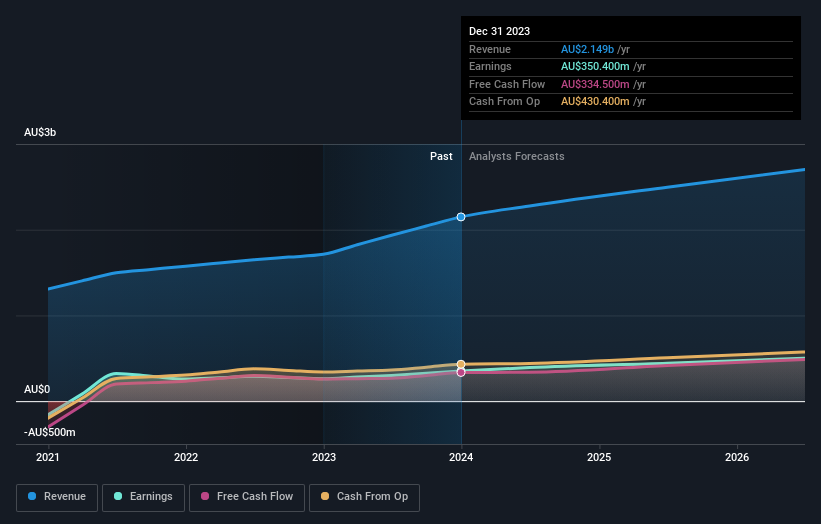Institutions along with retail investors who hold considerable shares inCochlear Limited (ASX:COH) come under pressure; lose 3.3% of holdings value
Key Insights
The considerable ownership by retail investors in Cochlear indicates that they collectively have a greater say in management and business strategy
40% of the business is held by the top 25 shareholders
Every investor in Cochlear Limited (ASX:COH) should be aware of the most powerful shareholder groups. And the group that holds the biggest piece of the pie are retail investors with 54% ownership. In other words, the group stands to gain the most (or lose the most) from their investment into the company.
While institutions who own 45% came under pressure after market cap dropped to AU$21b last week,retail investors took the most losses.
Let's take a closer look to see what the different types of shareholders can tell us about Cochlear.
Check out our latest analysis for Cochlear
What Does The Institutional Ownership Tell Us About Cochlear?
Institutional investors commonly compare their own returns to the returns of a commonly followed index. So they generally do consider buying larger companies that are included in the relevant benchmark index.
As you can see, institutional investors have a fair amount of stake in Cochlear. This suggests some credibility amongst professional investors. But we can't rely on that fact alone since institutions make bad investments sometimes, just like everyone does. When multiple institutions own a stock, there's always a risk that they are in a 'crowded trade'. When such a trade goes wrong, multiple parties may compete to sell stock fast. This risk is higher in a company without a history of growth. You can see Cochlear's historic earnings and revenue below, but keep in mind there's always more to the story.
Hedge funds don't have many shares in Cochlear. Looking at our data, we can see that the largest shareholder is BlackRock, Inc. with 6.8% of shares outstanding. In comparison, the second and third largest shareholders hold about 5.9% and 5.4% of the stock.
On studying our ownership data, we found that 25 of the top shareholders collectively own less than 50% of the share register, implying that no single individual has a majority interest.
While studying institutional ownership for a company can add value to your research, it is also a good practice to research analyst recommendations to get a deeper understand of a stock's expected performance. There are a reasonable number of analysts covering the stock, so it might be useful to find out their aggregate view on the future.
Insider Ownership Of Cochlear
The definition of company insiders can be subjective and does vary between jurisdictions. Our data reflects individual insiders, capturing board members at the very least. The company management answer to the board and the latter should represent the interests of shareholders. Notably, sometimes top-level managers are on the board themselves.
Most consider insider ownership a positive because it can indicate the board is well aligned with other shareholders. However, on some occasions too much power is concentrated within this group.
Our data suggests that insiders own under 1% of Cochlear Limited in their own names. As it is a large company, we'd only expect insiders to own a small percentage of it. But it's worth noting that they own AU$83m worth of shares. It is always good to see at least some insider ownership, but it might be worth checking if those insiders have been selling.
General Public Ownership
The general public, who are usually individual investors, hold a substantial 54% stake in Cochlear, suggesting it is a fairly popular stock. With this amount of ownership, retail investors can collectively play a role in decisions that affect shareholder returns, such as dividend policies and the appointment of directors. They can also exercise the power to vote on acquisitions or mergers that may not improve profitability.
Next Steps:
While it is well worth considering the different groups that own a company, there are other factors that are even more important.
I like to dive deeper into how a company has performed in the past. You can access this interactive graph of past earnings, revenue and cash flow, for free.
If you are like me, you may want to think about whether this company will grow or shrink. Luckily, you can check this free report showing analyst forecasts for its future.
NB: Figures in this article are calculated using data from the last twelve months, which refer to the 12-month period ending on the last date of the month the financial statement is dated. This may not be consistent with full year annual report figures.
Have feedback on this article? Concerned about the content? Get in touch with us directly. Alternatively, email editorial-team (at) simplywallst.com.
This article by Simply Wall St is general in nature. We provide commentary based on historical data and analyst forecasts only using an unbiased methodology and our articles are not intended to be financial advice. It does not constitute a recommendation to buy or sell any stock, and does not take account of your objectives, or your financial situation. We aim to bring you long-term focused analysis driven by fundamental data. Note that our analysis may not factor in the latest price-sensitive company announcements or qualitative material. Simply Wall St has no position in any stocks mentioned.

 Yahoo Finance
Yahoo Finance 

